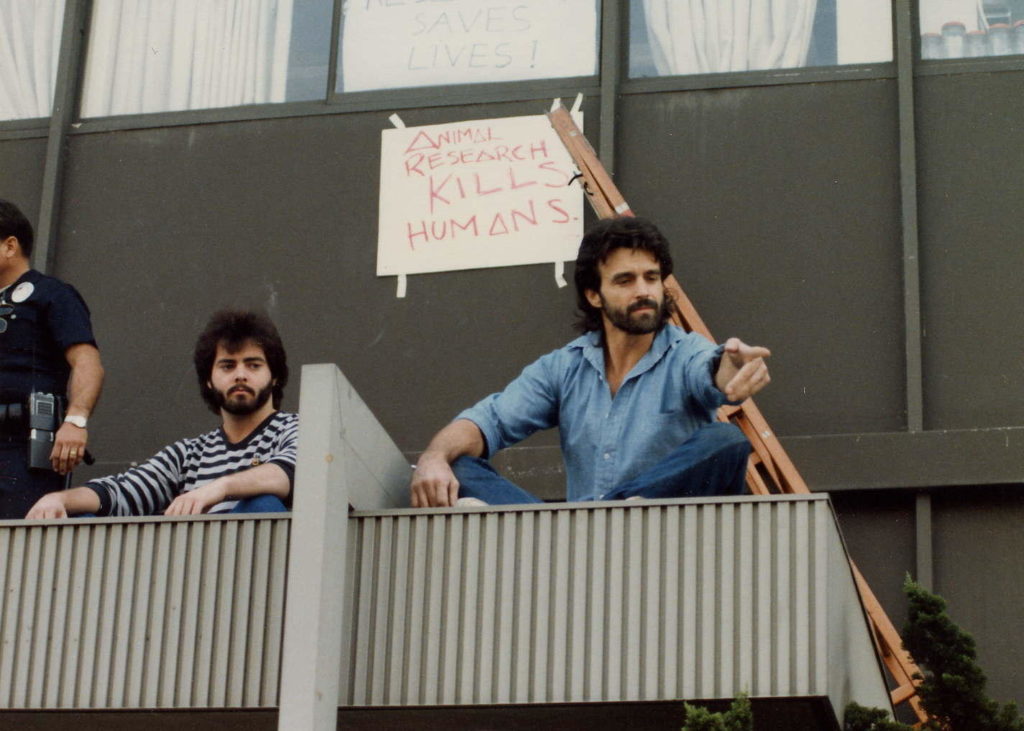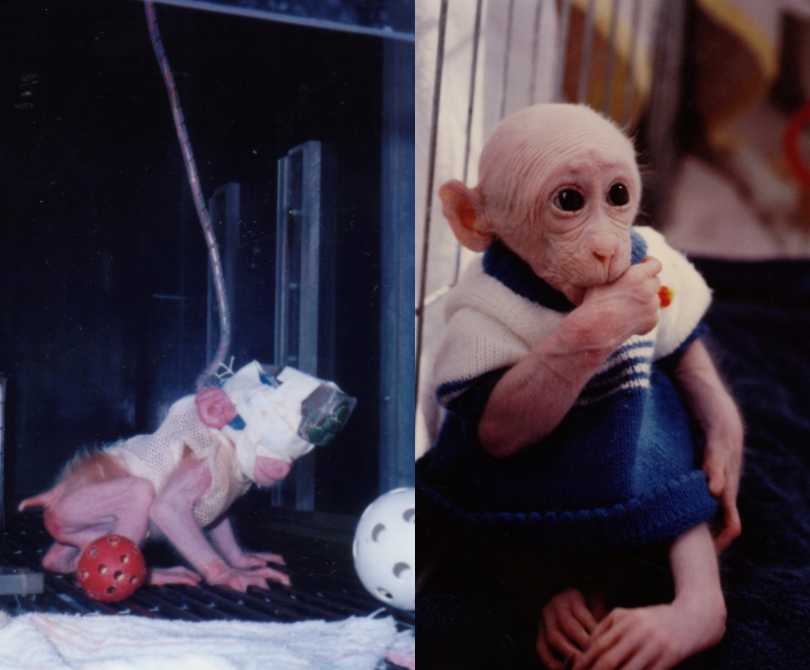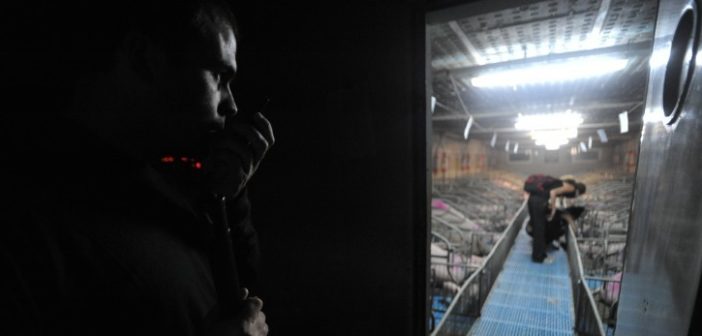Unfortunately, even when laws and regulations exist to protect animals, that doesn’t mean they’re always enforced. Due to a variety of variables, including the secretive nature of many animal-abusing industries and a common lack of oversight by authorities, animals often go through cruelty and suffering with little to no protection. This is when the investigative arm of the animal protection movement steps in, often in the form of organizations that send in undercover workers and then disseminate their findings.

Many of us have seen the end result of these undercover investigations, usually in the form of shocking footage of animals who already routinely suffer at the hand of humans being more intensely abused, such as in slaughterhouses or animal research laboratories. Though footage like this can of course be difficult to watch, collecting it is a powerful tool in our movement’s toolkit and has led to concrete change many times.
One organization that has been investigating and exposing animal cruelty for over thirty years is Last Chance for Animals (LCA). LCA has had a part in a number of high-profile cases against animal abusers over the years and has done the difficult work of infiltrating these difficult to access places and documenting evidence. In an interview with LCA Founder Chris DeRose, we discussed the logistics of the behind-the-scenes work to bring light to hidden animal abuse.
Dylan Forest: What inspired you to found Last Chance for Animals?
Chris DeRose: I was inspired to start Last Chance for Animals after taking in a stray dog. I took the dog home, fed him, and the next day I took the dog to the pound. As I was leaving the pound, I recognized the same look of longing and desperation in the dogs eyes that were in my eyes when I looked at my mother as she was leaving me at an orphanage when I was younger.
A large part of what LCA is known for is its work exposing animal cruelty through its investigations. How do your investigators gain access to the places they investigate, such as slaughterhouses and fur farms? Is this a risky venture for them?
LCA’s methods for getting our undercover investigators into these locations is confidential information, but I will say—it is always risky for them.
How long do investigations typically go on, and how is evidence gathered?
The length for each investigation varies. Some investigations last a few months, others longer. It depends on what the objective is of the investigation. Evidence is typically gathered using undercover cameras.

Is it frequently difficult for investigators to not only witness but also participate in cruel animal treatment? How do they prepare for this and cope?
It is difficult for our investigators to witness horrific and egregious acts of animal cruelty. They must compartmentalize and be objective and remember why they are in these situations in the first place: to expose animal abuse and collect evidence that we can use to hold the abusers accountable for their actions. I frequently remind the investigators, if they are having trouble witnessing the cruelty, to just imagine what the cruelty is like for the animals that must endure it.
There have been many efforts to criminalize investigations of animal-related industries, such as the United States’ ag-gag laws. Have there been legal repercussions for LCA or your investigators themselves for undertaking these investigations?
None for LCA or our investigators yet. These laws are set up to be a deterrent for exposing the truth. It’s called the “chilling effect,” intended to create a fearful atmosphere for investigators and organizations like LCA and to discourage the type of work we do. I consider it a direct violation of our first amendment rights. There may come a day that LCA or one of our investigators must defend themselves against these unconstitutional laws in a court of law. In the meantime, LCA continues doing the work we were founded on and we are not in the least discouraged in our work to expose cruelty and make real change for animals.
Once you’ve gathered the evidence, are you always happy with how the authorities respond to it? What is the ideal outcome of an investigation that uncovers illegal animal abuse, in your opinion?
In most cases, outcomes of undercover investigations exposing animal cruelty are extremely favorable. There are times when we are not happy with how authorities respond; this can be for different reasons sometimes political reasons, a result of short staffing, or the statute of limitation, for example.
We strive to expose the cruelty and get formal charges laid against the people and companies that are abusing animals. In many instances, the findings of LCA’s investigations are used to help pass laws, enforce laws or strengthen laws for animals. The ideal outcome is the closure of the facility, heavy fines, charges and imprisonment.
Are charges related to your findings typically pressed against individual workers or is the company responsible held accountable at a higher level?
Usually, the company responsible is held accountable. Many times, when a company finds out about their employees abusing animals, they let those employees go, but the company is still responsible.

I assume that part of the reason that LCA does the investigative work it does is that though in many cases the cruelty uncovered is breaking existing laws, little to no work is being done by the appropriate authorities to monitor animal exploiting industries and proactively enforce those laws. Why do you think there is so little oversight that an outside organization has to do these investigations?
Incompetence, enforcement agencies being understaffed and underpaid, apathy, an attitude of “they are just animals,” industry influence on law enforcement, and good ole boy networks.
What are a few of the LCA investigations that stand out to you as having made a big difference?
A Class B dealer investigation we conducted resulted in a precedent-setting guilty verdict against a class B dealer. [Class B dealers, also called “random source dealers,” sell unwanted companion animals from sources such as shelters.] This case marked the first successful felony prosecution in United States history for stealing pets to sell to research labs.
Our investigation at Marineland Canada helped lead to the passing of S-203, which banned the breeding, capture, and confinement of cetaceans [dolphins, whales and porpoises].
We also conducted an investigation of the production of Premarin, a menopause hormone product made by impregnating mares and collecting their urine. Mares are kept in abominable weather conditions and by-product baby foals are discarded like trash.
One of LCA’s more recent investigations was at Millbank Fur Farm in Ontario, Canada. What were some of the findings there, and has there been a resolution to this case?
LCA’s investigation led to 14 counts of animal cruelty charged against Millbank by the Ontario Society for the Prevention of Cruelty to Animals (OSPCA) in May 2018. This was the first in-depth undercover investigation of a fur farm in Canada. Our investigator documented disturbing accounts of animal neglect, animals with untreated wounds and infections, lack of adequate sanitary mink shelters and spoiled food. LCA also discovered during this investigation that there is little oversight and few laws that protect animals on fur farms. The case is still making its way through the justice system and is scheduled for a court date in 2020.
Featured image: investigators (not with LCA) at a factory farm in Spain. Image credit Jo-Anne McArthur / Animal Equality.






1 Comment
Watch the documentary “Animal People” produced by Joaquin Phoenix, the
True story of 6 college students at the turn
Of the century, who stood Up for change for horrific animal abuse, torture & murder in animal laboratory Experiments during the Bush, Jr. administration. (Bush jr Labeled these Grief stricken college Teen-Agers as Harden terrorists to make himself look Like a hero).
The college activists were sentenced to long term prison time (5-10 yrs) for Defending the VOICELESS. The truth about the lab animals they were defending was unlawfully kept away from the court-room jurors so that the jurors were kept in the dark as to what These college kids were actually protesting against.. A huge abuse by Bush, jr’s presidential power and a violation of the rights of the college Teen-angers who were doing the RIGHT thing. Needless to say, Bush Jr ruined the lives of these Decent teen-age Activists who were trying to stop animal torture and Make a better world for humans and animals. Order it on Amazon Prime now. It’s Life-changing.